Â
Renewable energy resources usage has seen a massive growth in the United Kingdom in the past two decades. Accentuated on the need to rapidly replace highly polluting fossil fuel based energy resources, the country has made rapid strides to make the country progressively more carbon neutral. Today nearly a third of the electricity produced by United Kingdom comes from renewable resources, and over 11 per cent of its total energy consumption in the country comes from renewable energy resources. United Kingdom is obligated as part of the European Union Renewable Energy Directive which requires the European Union to achieve 20 per cent of its energy from renewable sources by 2020 as per which interim targets are set for member countries. The United Kingdom met its fourth interim target during the 2017-18 period by a higher margin when its average renewable energy production for the period stood at 10.4 per cent against a target of 10.2 per cent.
United Kingdom is endowed with multiple natural advantages which it can conveniently exploit to harvest renewable energy. Wind, solar photovoltaics, hydro and shoreline waves, geothermal and tidal resources in the country are responsible for majority of the renewable electricity generation in the country. In the past two decades the consumption patterns of renewable energy in different energy sectors have also seen a sea change. The electricity sector has seen the fastest adaptation to renewable resources followed by heating sector which is then followed by the Transportation sector.
Renewable resource adaptation by different sector over the years
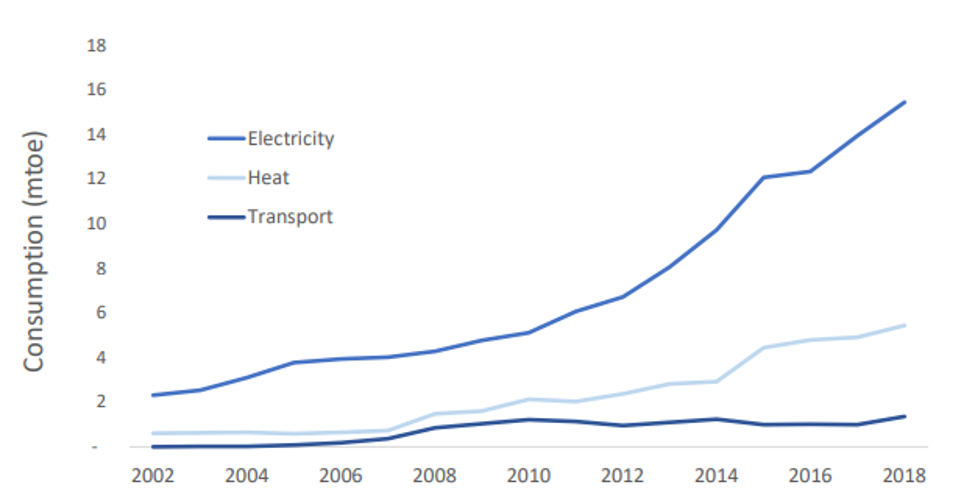 Â Â Â Â Â Â Â Â Â Â Â Â Â Â Â Â Â Â Â
                  Â
Source â DUKES 2019 Master Copy â Government of UK publication.
The UK Renewable energy roadmap published in July 2011 sets out the countryâs approach to unlocking its renewable energy potential. This roadmap builds on the actions already being undertaken in this regard. It provides for financial support mechanisms for renewables, setting up of Green Investment Bank to help companies avail investment for green infrastructure and promote development of new offshore wind manufacturing facilities at port sites. The envisaged measures plan to the separate Great Britain and Northern Ireland markets for all forms of electricity generation. Reforms will ensure that low-carbon electricity from a diverse range of sources, not just renewables becomes a more attractive choice for investors while delivering on long-term environmental changes while minimising energy cost to consumers.The roadmap also accentuates on the Job creation potential of this industry  and envisages nearly a quarter million people employed in the industry by 2020.
During the year 2018, the total renewable fuels used in the United Kingdom amounted to 22.2 million tons of Oil Equivalent.
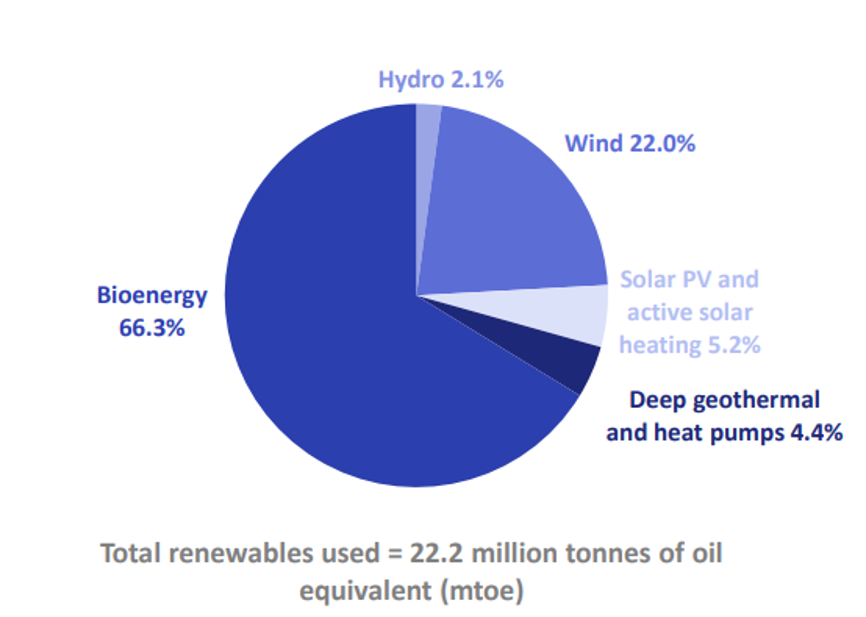 Â Â Â Â Â Â Â Â Â Â Â Â Â
            Â
Source - DUKES 2019 Master Copy â Government of UK publication.
Nearly two-thirds of the renewable fuels used in 2018 was bio-energy fuels. Within that space also the largest proportion was that of Plant biomass followed by Biodegradable energy from waste followed by wood and then by Land Fill gas. Nearly 5 million tons of oil equivalent of Plant biomass equivalent was used for electricity generation while 2 million tons of oil equivalent of Plant biomass equivalent was used for heating purposes in 2018. About 1.5 million tons of oil equivalent of Biodegradable energy from waste was used during the 2018 while less than 1 million tons of oil equivalent of Biodegradable energy from waste was used for heating purposes. Nearly 1.5 million tons of oil equivalent of Landfill gas was used during the 2018 while less than 1 million tons of oil equivalent of Landfill gas was used for heating purposes. Wood and wood waste were exclusively used for heating purposes during the year which in total amounted to close to 1 million tons of oil equivalent. The official renewable usage data for the year 2019 is awaited from the government.
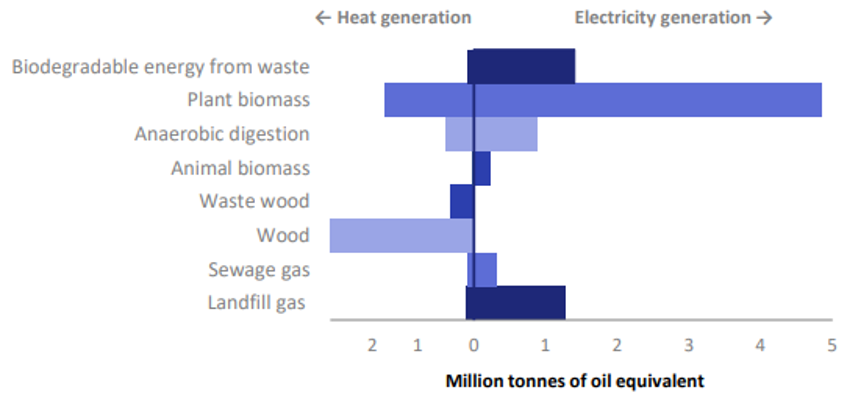 Â Â Â Â Â Â
     Â
Source - DUKES 2019 Master Copy â Government of UK publication.
In electricity generation, the proportion of wind energy in the total renewable resource-derived power produced has increased significantly since 2016. The generation of Hydro energy in the country has a seasonality factor in it, with production increasing during the second and third quarters every year and shrinking during the first and fourth quarters. Opposite seasonality effect is with Solar power generation; production in sector dwindles in the second and third quarters of the year and soars in the first and the fourth quarters. Bio-energy hasnât seen much growth in its proportions in renewable electricity production in United Kingdom since 2016. Nascent amounts of tidal resource-based electricity generation have been witnessed since fourth quarter of 2016, however, not much growth has been seen in it since then.
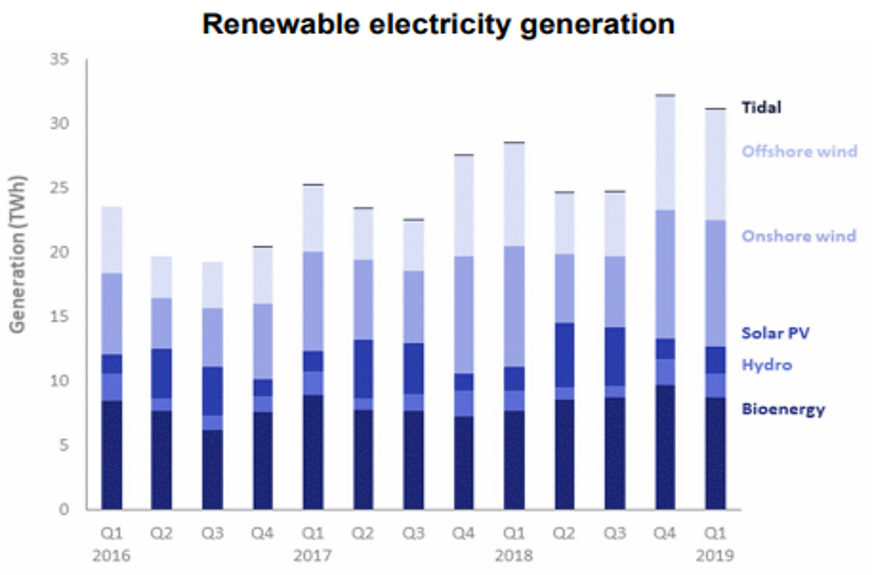
Source â Statistical Press Release, Department of Business, Energy & Industrial Strategy Govt of UK.
Dated- 27 June 2019
The country has consistantly met its renewable energy targets set for it in the 2009 European Union Renewable Directive.
Percentage of renewable electricity in total electricity production
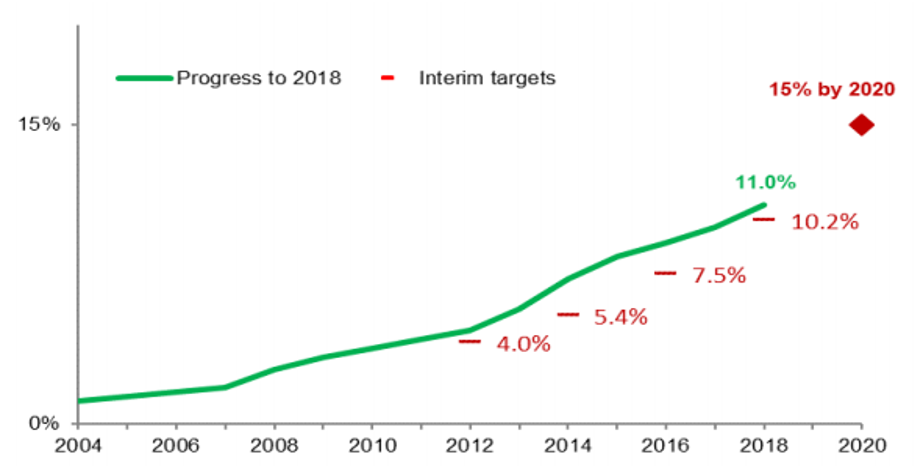
Source â Statistical Press Release, Department of Business, Energy & Industrial Strategy Govt of UK.
Dated- 27 June 2019
Government incentives - United Kingdom runs two schemes to support and incentivise renewable energy generation in the country. These schemes provide adequate impetus to investors to invest in this sector while not worrying about the safety of their investments.
 Contracts for Difference- This is the primary scheme in United Kingdom that supports new renewable electricity generation projects in the country. It takes care of the risks and uncertainties in the renewable energy sector and the underlying economics of different forms of electricity generation within its ambit by offering long-term contracts for low carbon energy generation. Contracts for Differenceâs are awarded to the cheapest projects via a competitive auction mechanism. Support is provided in the form of a private contract between a generator and the Low Carbon Contracts Company.
The Feed-in Tariffs â This scheme provides support for investment in small-scale renewable and low-carbon electricity generation projects of up to 5MW capacity. The scheme provides long-term support to such projects and provides tariffs based on costs of generation for each technology. Supported technologies are onshore wind power, combined heat and power, solar photovoltaic, small hydroelectric power systems and anaerobic digestion. Under this scheme generators receive payments in three forms.
- Generation tariff - Payment for every kWh generated, subject to technology, capacity and date installed.
- Export tariff â Additional payment every kWh exported to the local grid.
- Savings on electricity bill â Benefit for using the power onsite and not using grid imported power.
Below are three British Renewable energy Companies which have earned themselves a distinguished reputation for their work in the field.
- Green Energy (UK) plc â The company is a United Kingdom based independent green energy company which produces and distributes 100 per cent Ofgem certified renewable electricity, and gas to customers in England, Wales and Scotland.
Green Energy UK is the only energy supplier in the United Kingdom offering 100 per cent green gas and the only private company in the UK to give free shares to its customers.
Customers as shareholders can make suggestions and can attend its AGM and put questions to the board about its affairs, it has also been crowned 'Winner of Winners' in the Cisco Customer Kings competition in 2010.
- Ecotricity â This company is a United Kingdom based wind energy company, selling electricity to its customers from its portfolio of wind turbines producing a total of 87.2 megawatts electricity.
Other than wind power, the company also produces electricity from solar photovoltaics and supplies 100 per cent green gas produced through anabolic digestion.
Other than the above the company also has interest in land yachts, electric vehicle manufacturing and electric vehicle charging station infrastructure development.
- Good Energy Group plc â This is a United Kingdom Domiciled Green energy company that generates and purchases renewable electricity and supplies green electricity and gas to homes and businesses throughout the United Kingdom.
In 2008, Ethical Consumer magazine, adjudged Good Energy Group Plc as Best Buy for green electricity.
In 2018, the Office of Gas and Electricity Markets (Ofgem) Of United Kingdom rewarded the company for the service it provided to FiT (feed-in tariff) customers.





